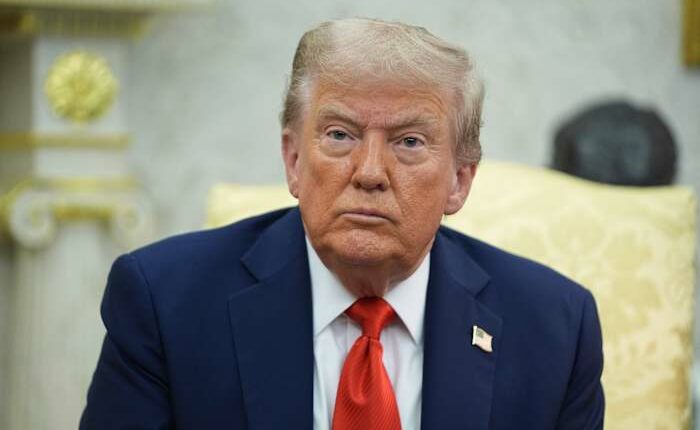Share this @internewscast.com

WASHINGTON – On Wednesday, the Trump administration escalated the tariff dispute to the Supreme Court, seeking a rapid decision affirming the president’s authority to implement extensive trade sanctions under federal statutes.
The administration urged the Supreme Court to overturn an appeals court’s decision that deemed the bulk of President Donald Trump’s tariffs unlawful under emergency powers legislation.
Although the U.S. Court of Appeals for the Federal Circuit has currently allowed the tariffs to stand, the administration pressed the Supreme Court for swift intervention in a petition submitted late Wednesday, which was shared with The Associated Press and anticipated to enter the docket on Thursday.
The appeals court, in a 7-4 decision, ruled following lawsuits from states and small businesses that claimed severe economic impacts from the tariffs. The decision largely confirmed a lower court’s ruling invalidating the tariffs.
“The ruling creates uncertainty over ongoing international negotiations that the President is conducting through tariffs, threatening both existing agreements and ongoing talks,” the Trump administration contended in its appeal, underscoring the high stakes involved.
Jeffrey Schwab, an attorney representing the beleaguered small businesses with the Liberty Justice Center, emphasized that the stakes for his clients are equally significant.
“These unlawful tariffs are inflicting serious harm on small businesses and jeopardizing their survival. We hope for a prompt resolution of this case for our clients,” he said.
The tariffs and their erratic rollout have shaken global markets, alienated U.S. trading partners and allies and raised fears of higher prices and slower economic growth.
But Trump has also used the levies to pressure the European Union, Japan and other countries into accepting new trade deals. Revenue from tariffs totaled $159 billion by late August, more than double what it was at the same point the year before.
Most judges on the U.S. Court of Appeals for the Federal Circuit found the 1977 International Emergency Economic Powers Act, or IEEPA, did not let Trump usurp congressional power to set tariffs. The dissenters said it did allow the president to regulate importation without explicit limitations during emergencies.
The ruling involves two sets of import taxes, both of which Trump justified by declaring a national emergency: the tariffs first announced in April and the ones from February on imports from Canada, China and Mexico.
The Constitution gives Congress the power to impose taxes, including tariffs. But over the decades, lawmakers have ceded authority to the president, and Trump has made the most of the power vacuum.
Some Trump tariffs, including levies on foreign steel, aluminum and autos, weren’t covered by the appeals court ruling. It also does not include tariffs Trump imposed on China in his first term that were kept by Democratic President Joe Biden.
Trump can impose tariffs under other laws, but those have more limitations on the speed and severity with which he could act.
The government has argued that if the tariffs are struck down, it might have to refund some of the import taxes that it’s collected, delivering a financial blow to the U.S. Treasury.
Copyright 2025 The Associated Press. All rights reserved. This material may not be published, broadcast, rewritten or redistributed without permission.










